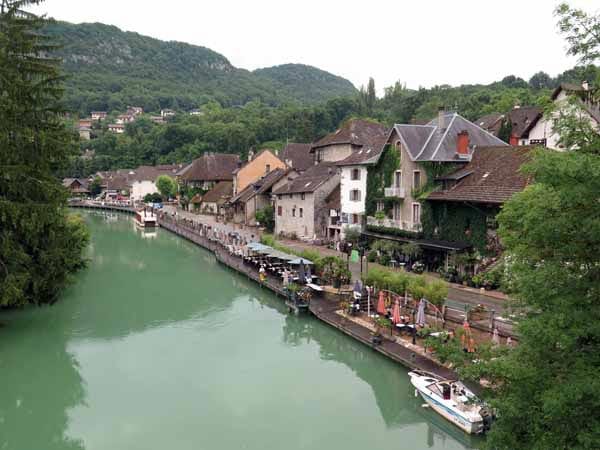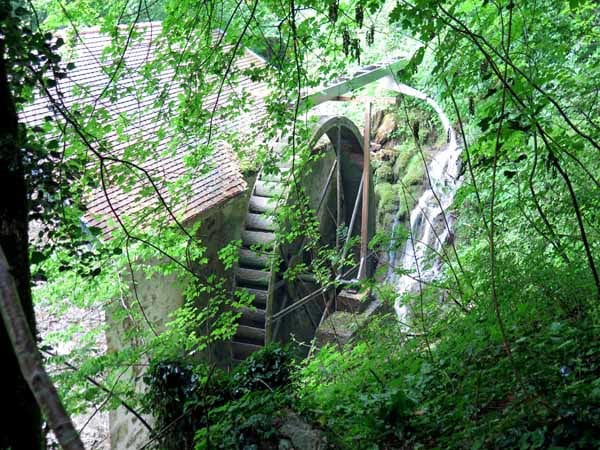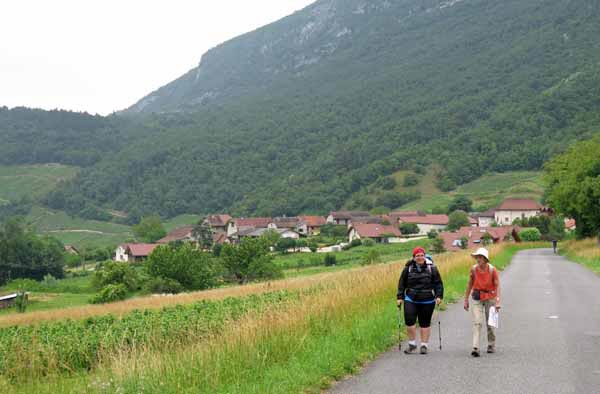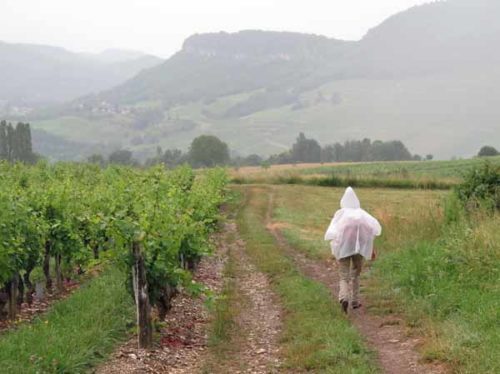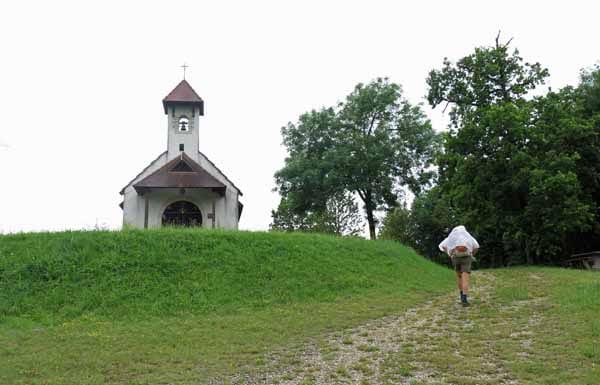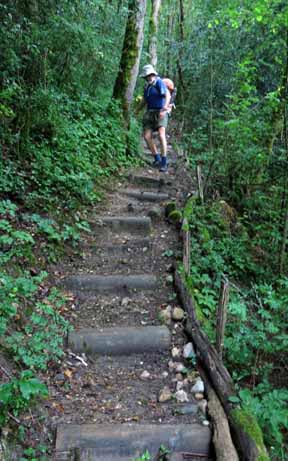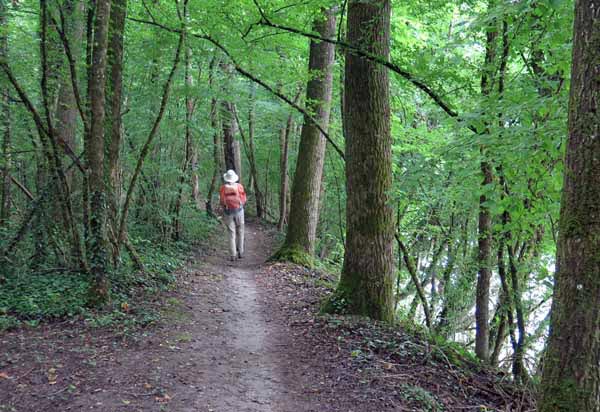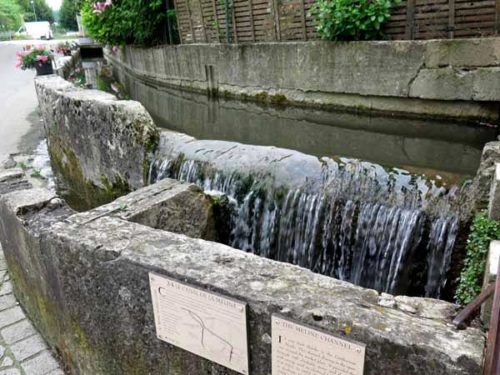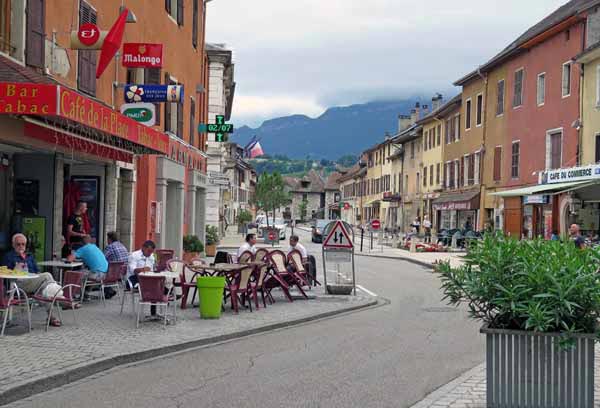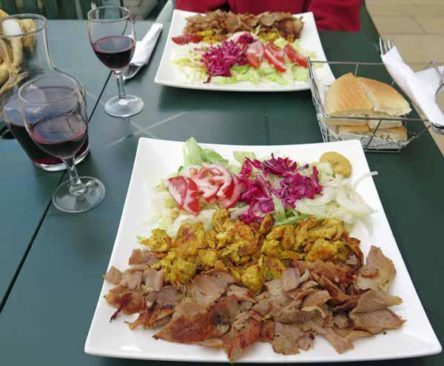Saturday, 2 July 2016
Distance 17 km
Duration 4 hours 50 minutes
Ascent 396 m, descent 410 m
Map 150 of the
Topoguide (ref. 650) Sentier vers Saint-Jacques-de-Compostelle : Genève – Le Puy
The weather had changed dramatically since we arrived in Chanaz. An evening thunderstorm was followed by drizzle during the night and another sharp downpour at dawn. The air was surprisingly cold and we realised that our plan to hurry away early was no longer needed.
Consequently we lay in bed until
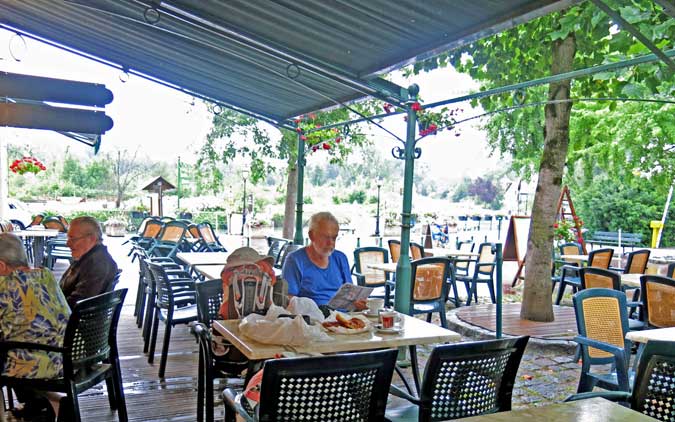
The hump-back bridge was slimy and treacherous after the rain, but with the aid of the handrails we made it across the canal onto the tourist strip, which was deserted except for a few fishermen sitting on bollards beside the water.
At the exact moment that we arrived in the main square, the Bar de la Place opened its doors, just as we had hoped. We sat under a large awning while the waitress swept rainwater off the exposed tables, an effort that was soon negated by the arrival of more showers.
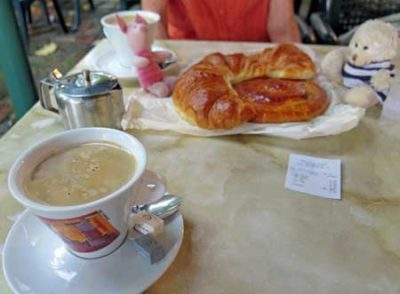
We had bought a bag of pastries from the boulangerie around the corner and proceeded to do them justice with the accompaniment of hot, strong milky coffees.
By the time we had finished, the rain had done likewise and the clouds had lifted somewhat, so we set off up the steep wooded hillside behind the houses, following GR signs.
We passed a small Gallo-Roman museum which would have been tempting if it had been open, and then a water mill with its great wheel still intact.
According to a sign, it was traditionally used, not for grinding grain, but for crushing walnuts to extract oil.
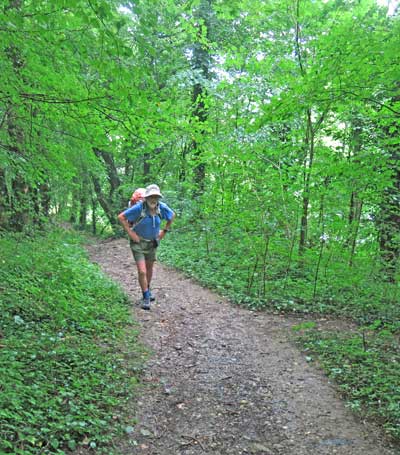
At the top of the rocky track we came out of the forest onto flat pastureland with a mass of vegetation hiding the great escarpment on our right, where the ground dropped like a stone to the river.
An hour or so of this peaceful strolling brought us to the houses of Vetrier, and here we parted company with the GR for a while. We took a gently descending road to avoid an unnecessary climb into the hills, and rejoined the GR at les Puthod.
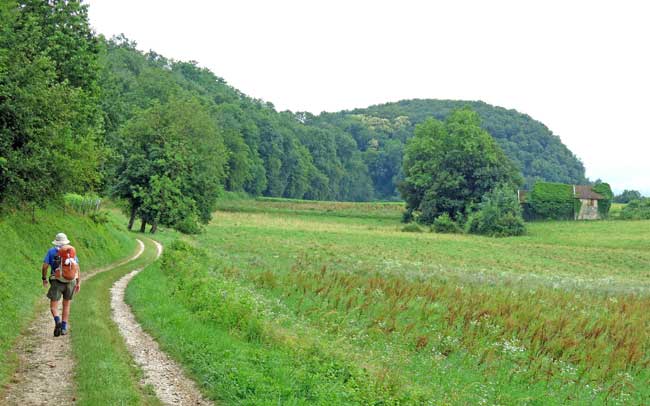
Below us we could see the valley of the Rhône opening out, with its patchwork quilt of vines. The track began to zig-zag down but we, once again preferring our own route, stayed on the little road that clung to the high ground. Even up here, pastures increasingly gave way to vines.
After half an hour the road slipped gracefully off the ridge and we reconnected with the GR at the grey and white church of Jongieux, standing like a lighthouse in a ribbed ocean of vines.
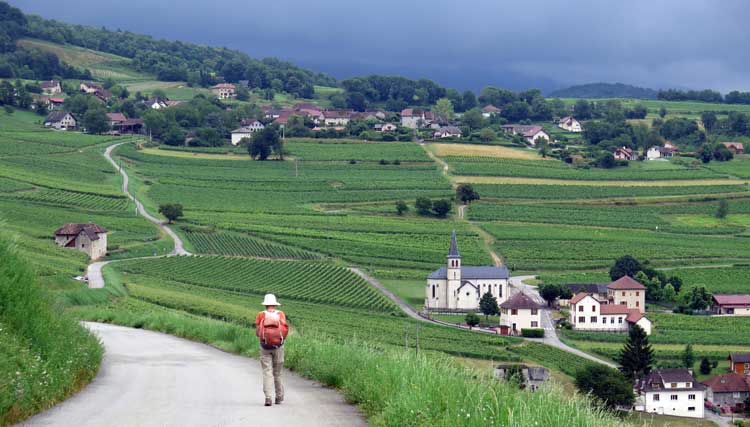
From there we climbed straight up between the rows of ripening grapes, several times crossing the bitumen road which looped like a snake up the hillside.
Looking back, we were surprised to see a walker coming up towards us, and another one further behind.
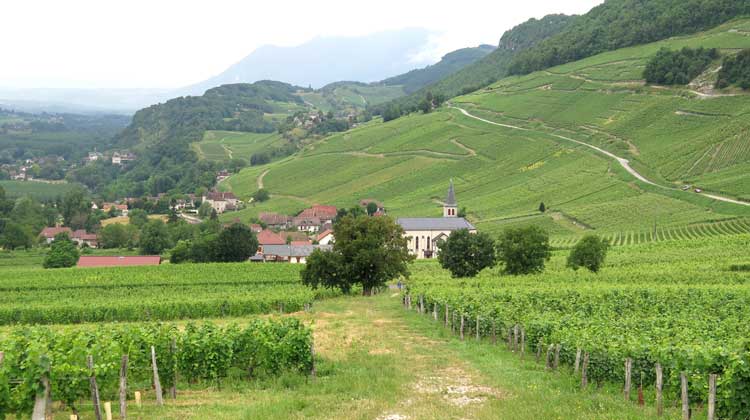
They turned out to be fellow pilgrims on the Way of Geneva, but as they had been staying in gîtes (and eating in them), we had never seen them before.
The first was a massive Swiss woman in a leotard and a backward-facing baseball cap, heavily laden and armed with two walking poles.
We spoke in French until she found we were Australian, whereupon she swapped to fluent American. The man behind caught up with us as we dawdled along.
He was a weather-beaten Austrian who had met our Swiss friend a few nights ago, when they shared the gîte at Chaumont. Having recently twisted his knee, he was walking very carefully.
All four of us wandered up through the vines towards the chapel of St-Romain until I had the idea of taking a short-cut.
There seemed to be a track marked on our map, but it turned out to be a contour line, and we spent a frustrating half-hour thrashing about in the vineyard, unable to get through, and for good measure it began to rain.
We eventually ended up back where we had turned off, and climbed up to the chapel, where we found the other two still sheltering in the porch.
The chapel is right on the cliff edge, a natural vantage point used for thousands of years, with a view of the valley far below.
In Roman times this chapel was dedicated to Silvanus, god of herds, fields, gardens and peasants – a useful local god.
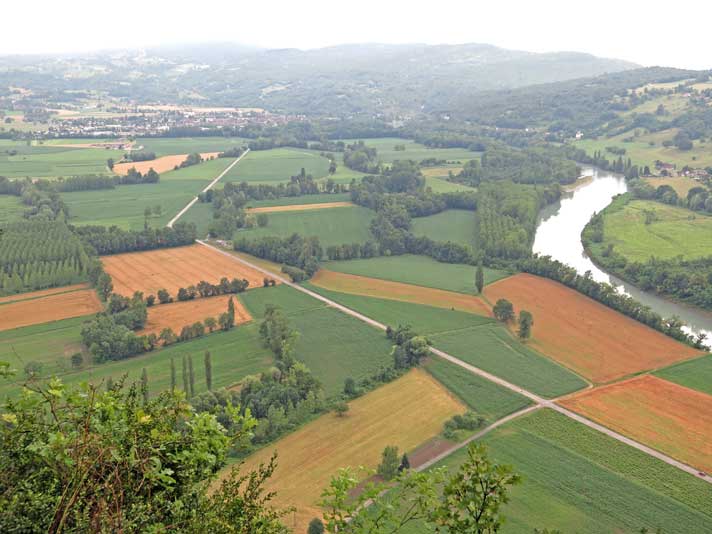
When the rain eased we set off along the edge of the cliffs and then down through the forest on a long, slippery staircase of logs and mud, a descent of more than 200 metres.
At the bottom the precipitous drop suddenly levelled out onto the river flats of the Rhône and there was a bitumen road, the D921, where our two new friends stopped to rest – they were staying at the gîte in Yenne and could not arrive until
We continued along the road for a short distance, then turned off on a wheel track through a field of maize to the riverbank.
After another half-hour of shady walking, slightly marred by a cloud of unpatriotic mosquitoes, we saw the first houses of Yenne through the trees.
The fence of the camping ground was in front of us, but unfortunately, the entrance was at the opposite end, so we had to go around on the road and through a couple of underpasses to get in.
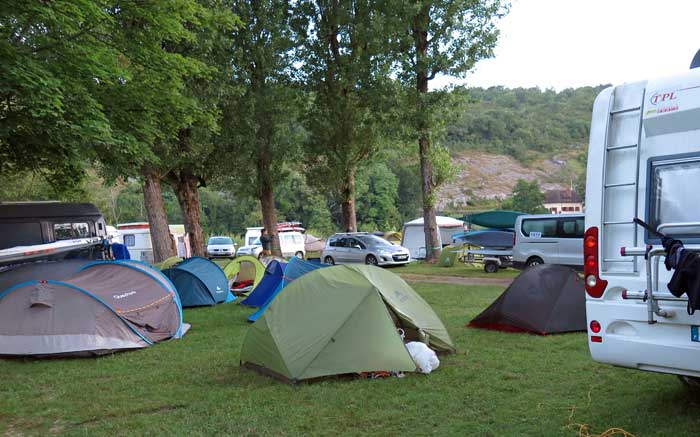
We were met by a frantic scene. Every available inch of the place was occupied by small tents, plus vans and trailers piled high with canoes.
The fence was loaded with soggy clothes, towels and wet-suits. On the other hand, there was hardly a soul in sight.
Our host explained that there was a national canoe-kayak championship taking place here this weekend, and that most people were out on the river at the moment.
We found a tiny free space among all the tents and put ours up, then swung into the usual ritual of showers and clothes washing.
It was cool and breezy so we went inside the tent for our afternoon rest.
Later we ventured into the town, which consisted of one charming, bent old main road and a few side streets. There were three bars, but nowhere for an evening meal except a very refined Logis hotel and a Turkish take-away place.
We rambled around looking at the sights, the most interesting of which was a system of canals which supplied drinking water to the town in previous centuries. A stream was diverted through the defensive walls and there were troughs at intervals along the streets.
In the nineteenth century the canals were covered over, but recently they have been restored to their former state, and even embellished with flower beds in places.
We sat down at the Bar du Centre and ordered Oranginas, as it was too early for apéritifs.
There was a wedding taking place that afternoon, and carloads of people came cruising past asking for directions to the church. Some of them even asked us.
At about
Just beside us was a section of the old canal adorned with a flower bed in the form of the Cross of Savoie.
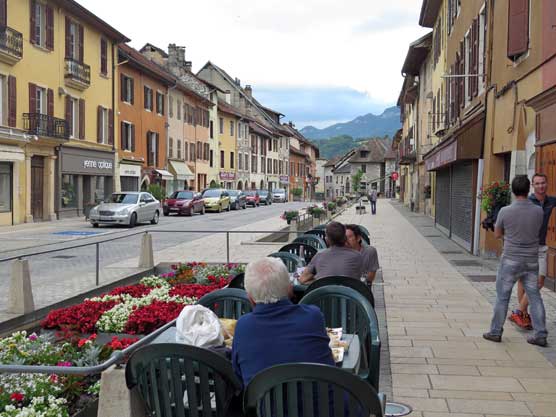
We noticed some people eating outside the Turkish takeaway next door, and the plates that they were served looked very enticing.
I went over and asked what they had ordered, and they said it was not on the menu, but that we could ask the cook to make it for us.
So we did. We said we wanted what the others were having, and the moustachioed chef was pleased to oblige.
It was a delightfully spicy plateful of all sorts of meats and vegetables, with Turkish bread and a carafe of the local wine. As we had forgotten to have lunch, it slipped down beautifully.
Back at the camping ground, the kayakers had returned in force and there was a general happy hubbub as they trekked to and fro to the showers, tripped over each other’s tent pegs, crouched around cooking stoves, called out to each other, laughed and chattered.
We retired to our little haven with this cheerfully raucous lullaby in our ears.
Previous day: Seyssel to Chanaz
